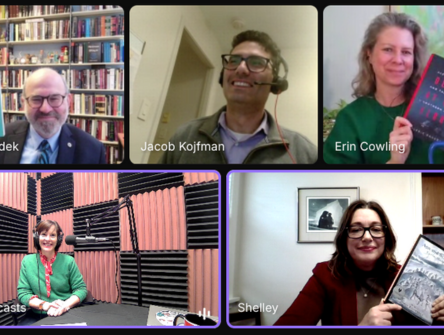Getting out in the world
You want to be a lawyer in international development? Four young professionals share some valuable advice.
.jpg?ext=.jpg)
Before she graduated from law school, Amélie Cournoyer knew she wanted to follow a career path that didn’t fit the mould.
“I was always interested in working abroad, and I was also drawn to NGO work,” says the 27-year-old lawyer, now based in Geneva.
Not that charting a course has been easy. For most legal professionals in Canada, the road to success bends toward the conventional. Hunt for an articling position at a firm; work there as a summer student; complete your articles; get called. If you’re lucky, take a month or two off to travel. But hurry back, because your junior associate position is waiting for you.
“For me, the whole experience completely changed the kind of career I wanted to pursue.”
Amélie Cournoyer - CBA Member
In the early stages, Cournoyer mostly stuck to the script. She graduated from the co-op program at the University of Sherbrooke, where she completed an MBA and LL.B. During her time there, she interned at a large national firm. But Cournoyer then decided to seek out different opportunities. She set her sights on international law, and landed another internship at a Washington-based consulting firm that specialized in international trade and investment issues. She would eventually article at the Canadian International Trade Tribunal in Ottawa, where she stayed as legal counsel for another year, before trying her hand again at private practice in a Toronto firm.
But the dream of working abroad nagged at her.
{^widget|(mobileimage)%7e%2fMediaGallery%2fNM%2fNationalMagazine%2fArticles%2fLaw%2fRule%252520of%252520Law%2fSIRD-Kwale-County-Kenya-mobile.jpg%3fext%3d.jpg|(alttext)Amilah+Abd-Al-Rashid%2c+Mwanasha%2c+and+Am%c3%a9lie+Cournoyer+in+Kwale+County%2c+Kenya+|(description)Amilah+Abd-Al-Rashid%2c+community+organizer+Mwanasha+Gaserego+Bakari%2c+and+Am%c3%a9lie+Cournoyer+in+Kwale+County%2c+Kenya|(name)NM.Widget.InlineImage|(attribution)Peter+Irungu|(desktopimage)%7e%2fMediaGallery%2fNM%2fNationalMagazine%2fArticles%2fLaw%2fRule%252520of%252520Law%2fSIRD-Kwale-County-Kenya.jpg%3fext%3d.jpg|(widget_displayname)_NM+Inline+Image|(width)|(height)^}
One day, she fell upon an ad on Facebook inviting applications to the CBA’s Young Lawyers International Program. Here was an opportunity to spend six months working on law reform with a partner organization in a foreign country.
She sent in her resume and, before long, was deployed to Madagascar, as part of a Transparency International project aimed at fighting corruption and strengthening access to information laws, so that communities could benefit from mining projects.
Though Madagascar faces considerable socio-economic, political and environmental challenges, Cournoyer saw an opportunity in this environment to gain precious field experience.
“For me, the whole experience completely changed the kind of career I wanted to pursue,” she says. She no longer saw herself strictly as a lawyer who only gives legal advice. She could envision a career as a professional who applies her legal training to project management in the international development sector.
“Working in Madagascar was the first time I felt I could be really useful and that my work could make a real difference,” she says. “It confirmed my interest in working in international development.”
And the work led to other opportunities, most recently a chance to volunteer on the CBA’s International Initiative Supporting Inclusive Resource Development in East Africa Project. SIRD is a five-year project funded by Global Affairs Canada and implemented by the CBA’s International Initiatives team in partnership with law societies in Kenya, Tanzania and Uganda. SIRD’s primary aim is to increase sustainable economic growth for East Africans, in particular women and vulnerable groups who are affected by extractive industries.
In November 2019, Cournoyer traveled to Kwale County, in Kenya. There she was paired with another Canadian legal research associate, Amilah Abd-Al-Rashid, to help local women’s groups understand their rights and the regulations that could help mitigate the negative impacts of mining activities on their lives.
Located near the Kenyan coast, some 50 km south of Mombasa, the Kwale titanium mine is run by a subsidiary of global mining giant Base Titanium. It’s the first significant, large-scale mining project in the country, and has opened up a new sector of the economy. Minerals now rank among the top four export earners in Kenya, and serve as a major revenue stream for the country of 50 million.
But as is often the case in resource-rich countries, the resulting wealth is not distributed evenly, especially for women. Never mind the persistent corruption and transparency problems that afflict the country. Extractives industries are overwhelmingly male dominated. For women, that means that employment opportunities are scarce — at least outside of the dangerous world of artisanal mining. Making matters worse, women disproportionately suffer the consequences of environmental damage, poor resettlement conditions, and the high influx of migrant workers — again, predominantly male — which often leads to rises in sexual violence.
The approach taken by SIRD is to bring all stakeholders together – all members of the community, including women, men and elders, as well as government and company officials – and getting them to work together.
{^widget|(mobileimage)%7e%2fMediaGallery%2fNM%2fNationalMagazine%2fArticles%2fLaw%2fRule%252520of%252520Law%2fSIRD-Kwale-County-Kenya-2-mobile.jpg%3fext%3d.jpg|(alttext)A+SIRD+community+outreach+event+in+Kwale+County%2c+Kenya+|(description)A+SIRD+community+outreach+event+in+Kwale+County%2c+Kenya+|(name)NM.Widget.InlineImage|(attribution)Peter+Irungu|(desktopimage)%7e%2fMediaGallery%2fNM%2fNationalMagazine%2fArticles%2fLaw%2fRule%252520of%252520Law%2fSIRD-Kwale-County-Kenya-2.jpg%3fext%3d.jpg|(widget_displayname)_NM+Inline+Image|(width)|(height)^}
“It was eye-opening,” says Abd-Al-Rashid. “What I like is the way that SIRD focuses on empowering women, but isn’t afraid of taking a broader view by looking closely at how the whole community is being impacted.”
On a personal level, Cournoyer and Abd-Al-Rashid’s experience abroad have allowed them to gain skills and grow professionally. “In Geneva, organizations are looking for people who have experience in the field, “ says Cournoyer. “It’s not a city where you begin your career.”
Now 28 years old, Abd-Al-Rashid graduated from law school at the University of Sussex in England, and works at TD in Toronto as a student-at-law. She expects to be called to the bar in Ontario this year. She’s also an alumnus of YLIP, having spent six months in Johannesburg, South Africa, working on a project to promote access to information on justice issues.
When the opportunity to work with SIRD came up, she says, “I figured, let’s do it and see if there is a way to marry legal work and international development.”
Though Abd-Al-Rashid is back in Canada, she still sees development work as something she wants to pursue once she gets called to the bar. “My parents are quite traditional,” she says. “They’d prefer I be a regular lawyer and stay close to home. But my ambition has always been to go abroad.”
It takes courage to chart a course in this fashion, independently, at the crossroads of law and international development. In truth, Abd-Al-Rashid’s time abroad has also taught her that many in the Canadian legal community are puzzled about her interest in working on international aid projects.
“It opened me up to a different structure. Working in an international organization is a completely different experience than working at a firm.”
Evelyn Palach - CBA Member
It’s hardly a secret that Canadian law firms are reluctant to hire graduates who have studied or cut their teeth abroad. They tend, for the most part, to focus their energies on recruiting lawyers who are happy to stay put.
“In a lot of [Canadian] firms, it’s much more important that you adhere to those expectations,” says Muhammad Zubair, 30, a Crown prosecutor in La Ronge, Saskatchewan, who has also volunteered in both the YLIP and SIRD programs. He acknowledges that following a conventional path can be fulfilling for many, but he cautions employers against being too narrow-minded about the skill set they’re looking for.
The same goes for career starters looking to get work experience. “This is a great way to explore your interests in international work and travel,” he says. “And it can really set you apart from the crowd that has only worked in GTA-based firms. If you’ve been abroad working on issues of gender-based violence and helping victims of sexual assault, it can be a phenomenal experience.”
In his current position, Zubair travels to circuit court points across a range of remote northern communities. He’s convinced his time abroad through the CBA strengthened is candidacy during his job interview. “After I started [working] here, the hiring manager even mentioned that this position tends to attract people that are adventurous and flexible and that I was exactly the type of person they were looking for.”
Still, Zubair laments the fact that career services at law schools rarely showcase opportunities to work for NGOs or in international aid. “[Career] events would usually involve firms from Windsor that would come in and do their pitch. Or we’d have an in-house counsel day. We’d have corporate commercial people come in. The most ‘out there’ we ever got was people involved in politics or government. But nothing like actively exploring international development work.”
Much like Cournoyer and Abd-Al-Rashid, Zubair stumbled upon the YLIP program doing research online. He ended up working traveling to Kyrgyzstan to work with the International Development Law Organization to improve the independence of the Central Asian country’s judiciary.
{^widget|(description)Muhammad+Zubair+and+Evelyn+Palach+in+Buliisa+District%2c+Uganda|(alttext)Muhammad+Zubair+and+Evelyn+Palach+in+Buliisa+District%2c+Uganda|(name)NM.Widget.InlineImage|(attribution)Martin+Jjumba|(desktopimage)%7e%2fMediaGallery%2fNM%2fNationalMagazine%2fArticles%2fLaw%2fRule%252520of%252520Law%2fBuliisa-District-Uganda-desktop.jpg%3fext%3d.jpg|(mobileimage)%7e%2fMediaGallery%2fNM%2fNationalMagazine%2fArticles%2fLaw%2fRule%252520of%252520Law%2fBuliisa-District-Uganda-mobile.jpg%3fext%3d.jpg|(widget_displayname)_NM+Inline+Image|(width)|(height)^}
That experience led to an extended contract with IDLO, and later to a placement working on the SIRD project in the Buliisa District in Western Uganda. Zubair and his colleague Evelyn Palach, a Kitchener lawyer, were sent there to help women’s groups in their efforts to spread information on women’s rights as they relate to extractive sector operations. They were also there to support training on regulatory frameworks and the harms and benefits of the extractive industry, more specifically involving the petroleum companies exploring in Western Uganda.
Palach, 28, who had worked in Myanmar as part of the CBA’s YLIP program, also emphasizes the value of gaining field experience abroad.
“My skill set really benefitted from working in Myanmar with an international organization and working on a project like SIRD,” she says. “It opened me up to a different structure. Working in an international organization is a completely different experience than working at a firm.” It gave her the chance, she adds, to interact directly with project managers, senior executives at the head offices of international organizations. Her experience in the field also helped her hone her cultural competency. “Exchanging knowledge and doing that sort of comparative work has always helped me look at things from a different point of view,” she says.
All of which are useful skills to bring back home. But being trained as a lawyer also helps open doors abroad, says Palach. “The classic entry point to international development is to land a position, perhaps as a United Nations Volunteer, or if you have funding from the Canadian government, through CUSO,” she says. “The skills you might be using in your job would be limited, whereas with YLIP and SIRD, there’s already an understanding that we’re sending young lawyers, and we’d like them to do international legal work.”
From that point on, the reward for work well done is the opportunity to do more. “The best networking you can do is show your work product,” says Zubair. “You can’t just go to Africa and relax and expect future opportunities will pop up. You have to get good reviews from the host country. And most people do. That helps them build relationships in a much more organic and natural environment than schmoozing at networking events.”
“A law degree is a passport to endless opportunities,” he adds. “Don’t limit yourself for no apparent reason, especially if you feel like your interests lie elsewhere.”
For more on the SIRD project visit CBA International Initiatives.


